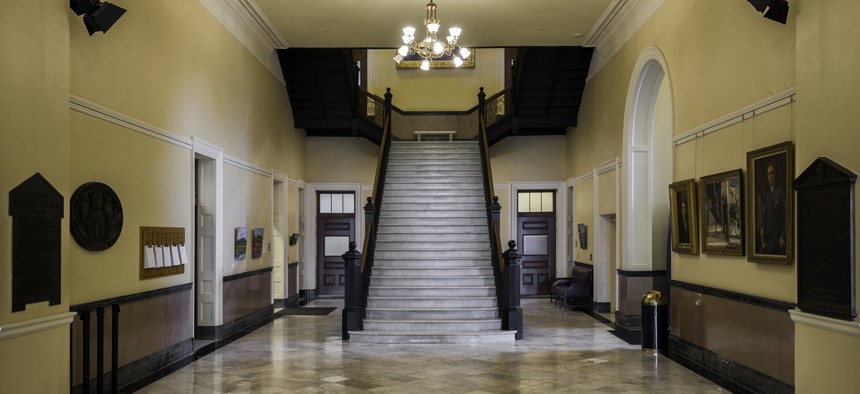The Fight for Medicaid Expansion Still Isn’t Over in Maine

The interior of Maine's State House building in Augusta Shutterstock
Plus an update on Medicaid ballot initiatives in Utah and Idaho, and what the legislative tiebreaker in Virginia means for that state’s expansion.
In November 2017, voters in Maine turned out in higher-than-expected numbers and supported Medicaid expansion by a 10-point margin. It marked the first time a state’s Medicaid expansion was approved by a ballot initiative rather than a vote from the legislature.
Barely 24 hours after the votes were tallied, Republican Gov. Paul LePage—who has vetoed expansion on five separate occasions—made an announcement that he would be taking steps to block the process unless lawmakers could come up with a way to pay for it without raising taxes, dipping into Maine’s rainy day fund or reducing services to the elderly or disabled.
LePage reiterated his opposition to expansion, and added further hurdles to the process, in a Dec. 11 letter to legislative leaders. The governor has until early April to follow through on his constitutional duty and submit expansion paperwork, but the state’s Democratic lawmakers are already promising to take LePage to court if he puts up a fight beyond that deadline.
The process in Maine may not be going as smoothly as advocates for the program might have hoped, nevertheless, the outcome has served as an example to campaigns in other expansion holdout states.
Will Idaho and Utah Voters Decide Medicaid Expansion Next?
State Republican lawmakers in Idaho have long-opposed Medicaid expansion. So, taking a page out of Maine’s playbook a group called Reclaim Idaho is leading a ballot initiative effort to circumvent the legislature. The goal is to cover the 78,000 Idahoans who aren’t currently eligible for the federal program, but also make too much money to qualify for subsidized private insurance.
The group needs at least 56,192 signatures from registered voters by April 30 of this year to get their initiative onto the 2018 ballot.
In the Beehive State, a group called Utah Decides Healthcare is attempting a similar play to the one being carried out in Idaho. The expansion measure would be financed through an increase in the state’s sale tax from 4.7 to 4.85 percent. The group is required to conduct seven public hearings across the state and collect at least 113,143 signatures from registered voters by April 15. Polling appears to indicate that a majority of Utahns support the initiative. A late December survey from pollster Dan Jones & Associates found that 59 percent of voters approve of expansion.
In Virginia, a Random Draw Presents a Setback
When a Virginia elections official pulled Republican David Yancey’s name out of a bowl on Thursday, breaking a tie that had seen both Yancey and Democrat Shelly Simonds get 11,608 votes, he did more than return majority control over the House of Delegates to the GOP. The 51-49 majority Republicans now enjoy in that legislative body will also complicate the fight to expand Medicaid to as many as 400,000 Virginians, something Democratic Gov. Terry McAuliffe has attempted once for each of his years in office.
Now, any Medicaid expansion plan that Virginia would hope to pass would need to gain bipartisan support in both legislative bodies. In the Senate, Republicans hold a 21-19 majority.
Still, the odds are far better than they were the last time the legislature defeated an expansion plan. In early April, 2017 the state’s House of Delegates rejected a plan to expand Medicaid 66-34 along party lines.
Quinn Libson is a Staff Correspondent for Government Executive’s Route Fifty and is based in Washington, D.C.
NEXT STORY: Trump Seeks to Nominate McConnell Staffer as Appalachian Regional Commission Co-Chair






